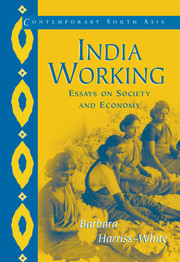Crossref Citations
This Book has been
cited by the following publications. This list is generated based on data provided by Crossref.
Mandel, Jennifer L.
2004.
Mobility matters: women's livelihood strategies in Porto Novo, Benin.
Gender, Place & Culture,
Vol. 11,
Issue. 2,
p.
257.
Pellissery, Sony
2006.
Does Multi-level Governance Meet Local Aspirations? The Case of Social Protection Needs in Rural India.
Asia Pacific Journal of Public Administration,
Vol. 28,
Issue. 1,
p.
25.
Kumar, H.M. Sanjeev
2008.
Contesting Modernity: Crises of Democratisation in South Asia.
India Quarterly: A Journal of International Affairs,
Vol. 64,
Issue. 4,
p.
124.
Khan, Farida
and
Ghadially, Rehana
2009.
Gender-differentiated Impact on Minority Youth of Basic Computer Education in Mumbai City.
Gender, Technology and Development,
Vol. 13,
Issue. 2,
p.
245.
van Klinken, Gerry
2009.
Decolonization and the Making of Middle Indonesia.
Urban Geography,
Vol. 30,
Issue. 8,
p.
879.
Picherit, David
2010.
Circulation et territoire dans le monde indien contemporain.
p.
135.
Maiti, Dibyendu
and
Sen, Kunal
2010.
The Informal Sector in India.
Journal of South Asian Development,
Vol. 5,
Issue. 1,
p.
1.
Véron, René
2010.
Small Cities, Neoliberal Governance and Sustainable Development in the Global South: A Conceptual Framework and Research Agenda.
Sustainability,
Vol. 2,
Issue. 9,
p.
2833.
Jarmara, Tomáš
2012.
Historical Development of the Citizenship: Differentiate Citizenship.
Civilia,
Vol. 3,
Issue. 1,
p.
4.
Viswanathan, Madhubalan
Sridharan, Srinivas
Ritchie, Robin
Venugopal, Srinivas
and
Jung, Kiju
2012.
Marketing Interactions in Subsistence Marketplaces: A Bottom-Up Approach to Designing Public Policy.
Journal of Public Policy & Marketing,
Vol. 31,
Issue. 2,
p.
159.
Harriss-White, Barbara
Prakash, Aseem
and
Mishra, Deepak
2013.
Citizenship as Cultural Flow.
p.
187.
Heyer, Judith
2013.
Integration into a Global Production Network: Impacts on Labour in Tiruppur's Rural Hinterlands.
Oxford Development Studies,
Vol. 41,
Issue. 3,
p.
307.
Landy, Frédéric
François, Thomas
Ruby, Donatienne
and
Sekhsaria, Peeyush
2013.
Gouvernance verticale et corruption en Inde urbaine : la segmentation spatiale de l’aide alimentaire publique.
L’Espace Politique,
Vidyarthi, Sanjeev
Hoch, Charles
and
Basmajian, Carlton
2013.
Making sense of India's spatial plan-making practice: Enduring approach or emergent variations?.
Planning Theory & Practice,
Vol. 14,
Issue. 1,
p.
57.
Mezzadri, Alessandra
2014.
Indian Garment Clusters and CSR Norms: Incompatible Agendas at the Bottom of the Garment Commodity Chain.
Oxford Development Studies,
Vol. 42,
Issue. 2,
p.
238.
Landy, Frédéric
2014.
Gouvernance verticale, corruption et clientélisme.
Revue européenne des sciences sociales,
p.
105.
Guérin, Isabelle
2014.
Juggling with Debt, Social Ties, and Values.
Current Anthropology,
Vol. 55,
Issue. S9,
p.
S40.
Bedi, Heather Plumridge
and
Tillin, Louise
2015.
Inter-state Competition, Land Conflicts and Resistance in India.
Oxford Development Studies,
Vol. 43,
Issue. 2,
p.
194.
Taylor, Christopher B.
2015.
Madrasas and Social Mobility in the Religious Economy: The Case of Nadwat al-’Ulama in Lucknow.
South Asia Multidisciplinary Academic Journal,
Singh, Ramendra
Bakshi, Madhupa
and
Mishra, Prashant
2015.
Corporate Social Responsibility: Linking Bottom of the Pyramid to Market Development?.
Journal of Business Ethics,
Vol. 131,
Issue. 2,
p.
361.



